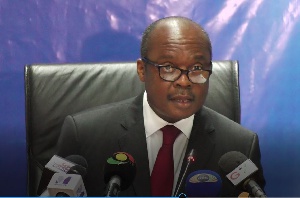We have been asking persons and institutions involved in the Ghana banking scandal to come out voluntarily to explain their respective roles and seek public understanding.
So far just about Prince Kofi Amoabeng of UT Bank, Pastor Mensa Otabil of Capital Bank and KPMG have made statements.
That is good.
Is everybody else quiet because their legal advisers are telling them to keep quiet and hope the scandal passes off quietly?
However, for discerning minds and independent thinkers, there are a lot of questions that will simply not go away.
Those questions need to be addressed in a logical and coherent manner.
As we promised, we have compiled them.
First, ACCOUNTANTS, AUDITORS and DATA ANALYSERS
1. Did our bankers learn in school that without trust there is no banking?
2. Why do our financial institutions want to hire persons who have been trained in Europe and North America; is it not about the expectation that they will do better?
3. Do our auditors and accountants know what it means to be faithful even when no one is watching?
4. Do our auditors know that the word audit refers to sound; to hear everything?
5. Does KPMG think it is enough to tell the public that they have not been part of the Ghana Banking Awards since 2012 without telling us why?
6. Do KPMG and Ernst & Young think that the bad reputation they suffer globally has no effect on Ghanaians and for which reason they should tell us anything?
7. Do Morrison and Associates, PKF, and J Mills Lamptey & Co answer yes to being called auditors of Beige Bank, Capital Bank and Construction Bank respectively and if so, do they think the banking public and international investors deserve some respect by way of a statement or they have their own internal workings of lobbying influential persons quietly?
8. Do the analysers of the banking awards know that their expertise in taxation, accounting principles, audit and advisory services were used as the criteria to hire them?
9. Do the analysers of the banking awards know that the supposed international reputation of their parent company, that brand image, was relied upon to hire them?
10. Does Corporate Initiative Ghana, the organisers of the Ghana Banking Awards know that they have questions to answer to the banking population?
11. When thirty-three banks meet to form a committee to determine banking awards criteria, and they have this massive scandal on their hands, do they not think they have to tell the public anything?
12. Are the 33 banks telling us, that they are so gullible that they could not perceive any possible misjudgement of Ernst and Young or are we to believe the unsavoury rumours that since they buy the awards, they have all decided to keep quiet over their collective shame?
13. Do the 33 banks know that they are supposed to tell us the extent of their lending and exposure to the collapsed banks as well as those that have not collapsed so that we can have faith in the banking system?
14. Does Corporate Initiative Ghana think that today they can just keep quiet over the next Ghana Banking Awards when last year July they were all over the media with their awards?
15. Do these banking awards gurus, both individual and corporate, think their social networks will protect them in scratch-my-back-I-scratch-your-back fashion?
16. In a country where only one percent of institutional sewage is treated, do these individuals really think they have any worthwhile social networks of high ranking men and women?
17. Do Ernst and Young, which audit UT Bank and Sovereign Bank, yet was endorsed by the 33 banks as analysers of the Ghana Banking Awards not deem it appropriate to tell the nation anything about the current scandal, and if not, what about the individuals in charge of that organization?
18. More particularly, since Ernst and Young have audit, tax and management consulting departments, do they think that an explanation that they are just analysers of the votes received from the public is fair and professionally acceptable?
19. Do the senior staff of Ernst and Young think that a jury of their peers will absolve them from their responsibility for ignoring any tax or audit infractions?
20. Do Deloitte and Touche wish to tell us that they have not heard that uniBank and Royal Bank have collapsed?
21. Are Deloitte and Touche still getting auditing jobs and what do they tell their clients to make them believe that no blame can be put at their doorstep?
22. How come the Ghana Banking Awards has so many categories and divisions- is it in response to unfairness and cheating?
23. Do the affected publicity organisations think they have no legal obligations or they want someone to sue them for fraud and deception before they tell us anything?
24. Is there any one individual among these publicity organisations who has decided, since the Bank of Ghana press conference of 1st August 2018, to resign on the principle that (s)he spoke or wrote memos and was ignored and cannot with heart and mind continue deceiving the public through advertisements which present inaccurate information?
25. Has any such individual resigned since 1st August 2018 out of shame for negligence of duty?
26. Do our government institutions think that spending millions and billions of Cedis on everything else placed in front of them matters more than water and sanitation?
27. Does the Ministry of Finance and Bank of Ghana think that spending eight billion Cedis in the face of years of evidence of banking rot matter more than years of neglect of algae-infested urban water supply?
28. Does the Eisenhower Decision Making Matrix or any other decision making model mean anything to our political administration and if not how then does it make decisions?
29. When our finance ministers always rush to get parliamentary approval for expenditure before parliament rises, how did they not think that eight billion Cedis and counting, (roughly US$1.7billion against a tax revenue of about US$7billion a year) could be spent by them without the approval of the reps of the people or are we to assume that they always find a way of spending and getting retroactive approval?
30. Who is vetting the advertisements and other promotional material being churned out by the ad agencies that produced the ads of the collapsed banks?
We respectfully wish to draw the attention of all the persons and institutions whom we have addressed above and their legal advisers that integrity goes beyond mere honesty.
The Court of Appeal of the United Kingdom defined integrity in Wingate & Anor v The Solicitors Regulation Authority.
We quote Lord Justice Jackson in part thus, ‘The professions have a privileged and trusted role in society.
In return they are required to live up to their own professional standards.’
He continued ‘Integrity connotes adherence to the ethical standards of one’s own profession. That involves more than mere honesty.’
Lord Justice Jackson surmised, ‘A professional person is expected to be even more scrupulous about accuracy than a member of the general public in daily discourse.’
So there it is.
Being scrupulous means all the laid down steps must be followed without evasion or equivocation.
Writers and Shakespeares Ghana Limited exists to be a moral and intellectual guide to the best practice of public relations and integrated communications around the world, beginning with Ghana.
Hence, we believe that if you cannot follow the scruples required by your career or profession when no one else is watching, then you are not practising at the right standard and are an absolute danger to the public.
For feedback please email the writer via ato@writersghana.com
Opinions of Wednesday, 22 August 2018
Columnist: Isaac Ato Mensah















